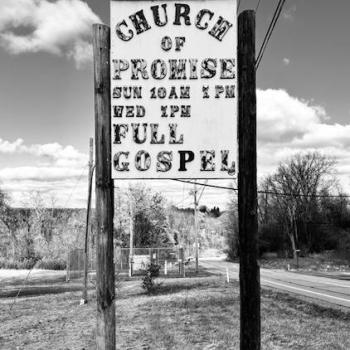Lurking beneath Philips's distaste for particular political positions is a much more radical ideological argument, a seemingly intractable dispute about how human society should work.
This society functions in a certain way, according to certain assumptions, which usually settle around the notion that moral and social progress is possible so long as we hew to "rational" ways of thinking. We must merely educate the masses about this, and as long as they're busy praying that will, alas, not happen. Such people cannot be reasoned with -- indeed, few of these writers seem to see any use in trying -- and thus they have no business participating in the work of a democratic government. This is where, as Damon Linker points out, the God Scare turns against the very predicates underlying American self-government. (See here, for instance, Dawkins's God Delusion, 301-7, or Sam Harris's Letter to a Christian Nation, xi-xii; as Harris states, "It should be blindingly obvious that beliefs of this sort will do little to help us create a durable future for ourselves -- socially, economically, environmentally, or geopolitically." Instead, he endorses special religion free schools.) Though I'd warn him that using the word "obvious" generally signals that your argument is in fact aspirational, Sam Harris is nonetheless pretty sure that a durable future can be gained as long as religious people don’t keep mucking politics up.
This conviction that religious people are fundamentally incapable of participating in self-government is distasteful but not entirely unexpected. Proponents of the God Scare resemble 19th-century British Whig historians or the early 20th-century progressives, confident that they had captured the formula to a perfect world; it had simply to be executed in the proper way -- through, say, sea power, unflappability, and constitutional parliamentarianism, or the progressives’ early 20th-century attempt to apply vaguely scientific sociological principles to the great unwashed. Advocates of the God Scare tend to be technocrats; they don't see much reason to distrust government (unless it's run by the wrong people) because they have confidence in expertise ultimately derived from science, and tend to understand social policy in functional rather than ideological terms. These convictions led the progressives -- whom the God Scare increasingly resembles -- to worry that people who did not share their particular Victorian technocratic ideals might not be fully fit to participate in American democracy and enacted voting restrictions to ensure that this was so. In this way, the God Scare embodies the sort of nagging self-doubt about democracy that's an interesting undercurrent in American politics.
But just like that, we've found our way from the first critique to the second; from ideology to methodology. What the God Scare finds even more maddening than religious beliefs is the incomprehensibility of why religious people hold them, and here two particular issues arise: authority and what has traditionally been called "enthusiasm" -- emotional expressions of religious experience. Both are troublingly irrational.
Michelle Goldberg, in her book Kingdom Coming, admits to "anxiety" that "the mass movement I’ve described aims to supplant Enlightenment rationalism with what it calls the Christian worldview," in which Christian people would, troublingly, use Christianity to make decisions about things. According to Goldberg, that Christians might do this has its logical conclusion in her belief that "millions" of Americans want to supplant our current form of government with what is apparently a well-thought-out and agreed upon national theocratic agenda with clear and unanimous positions derived from the Bible (which is apparently entirely clear on all sorts of points; this is probably news to Christianity) "on every issue, from gay marriage to income tax rates" (Kingdom Coming excerpted here).
Because these authorities, like, say, the Epistle to the Romans or Siddhartha or the pope, are just that -- authorities, rather than logical conclusions -- it seems self-evident that they are untrustworthy to comment on issues of social policy or international relations. Dawkins, for instance, believes that "religious faith is an especially potent silencer of rational calculation," and asks indignantly, in reference to the leaders of Western faiths, "who elected them, by the way?" (God Delusion, 306).




